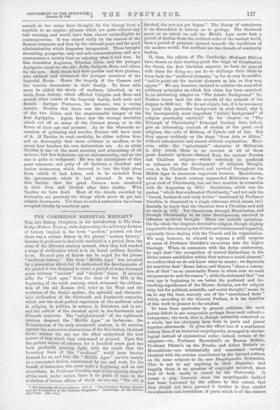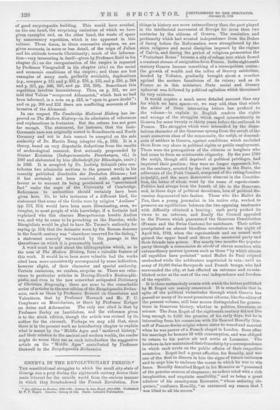THE CAMBRIDGE MEDIEVAL HISTORY.*
THE late Bishop Creighton, in his introduction to The Cam- bridge Modern History, while deprecating the arbitrary division of history implied in the term "modern," pointed out that there was a certain fitness in the phrase" modern history," because it professes to deal with mankind in a period, from the close of the fifteenth century onward, when they had reached a stage of civilization which is in its broad outlines familiar to us. No such plea of fitness can be urged for the phrase "medieval history." The term "Middle Ages" was invented by a generation which but ill-understood the developments of the period it was designed to cover, a period of some thousand years between "ancient" and " modern " times. It covered alike the "dark ages," from the close of the fifth to the beginning of the tenth century, which witnessed the oblitera- tion of the old Roman civil order in the West and the evolution of the feudal system ; the splendid and character- istic civilization of the thirteenth and fourteenth centuries, which saw the most perfect expression of the medieval mind in religion, in politics, in science, in literature, and in art; and the rebirth of the classical spirit in the fourteenth and fifteenth centuries. The "enlightenment" of the eighteenth century despised the "Middle Ages" as barbarous : the Romanticism of the early nineteenth century, in its reaction against the subversive abstractions of the Revolution, idealized them : neither the one nor the other understood the true nature of that which they contemned or praised. Upon this the patient labour of scholars for a hundred years past has been gradually pouring light, with the result that the boundary lines of the "medieval" world have become blurred for us, and that the "Middle Ages" survive mainly as a convenient fiction, consecrated by use and wont, for the benefit of historians who must make a beginning and an end somewhere. As Professor Gwatkin says in the opening chapter of the work under review, there is no point of time in the evolution of human affairs of which we can say, "The old is • me CambridgeAfrdierat Moroni. Vol. I. "The Christian Roman Einpiro and the Foundation of the Tentonio 3Cin5deme." Cambridge 3 at the Univer- sity Press. C20s. net.1
finished, the new not yet begun." The theory of cataclysms is as discredited in history as in geology. The thousand years or so which we call the Middle Ages cover first a period of decline from the civilized order of the ancient world, then a period of progress upward towards the conditions of the modern world ; but nowhere are the threads of continuity broken.
If, then, the editors of The Cambridge Medieval History
have chosen as their starting-point the reign of Constantine the Great, the first Christian emperor, we have no quarrel with them for doing so ; nor do we challenge their claim to trace bank the "medieval elements," as far as may be needful, "and to point out the ancient elements as late as they may appear." We are, however, inclined to criticise the somewhat arbitrary principles on which this claim has been exercised.
In an interesting chapter on The Asiatic Background" Dr.
Peisker traces back the dim records of the nomads of the
steppes to 8000 B.C. We do not object; but, if it be necessary
to paint this particular background in such detail, why is the incomparably more important "Asiatic background" of
religion practically omitted 1' In his chapter on "The
Triumph of Christianity" Principal Lindsay does, indeed, give an interesting account of certain of the great rival religions, the cults of Mithras, of Cybele and of Isis. But they appear suddenly on the stage "from Asia or Africa," without introduction and almost without explanation. More- over, while the " salvationist " character of Mithraiam is duly noted, there is no account at all of those great dualistic systems—derived from the ancient Persian and Chaldean religions —which exercised so profound
an influence on the development of religious thought, even in the Christian Church, and survived throughout the Middle Ages in numerous important heresies. Maniclueism, which in the fourth century superseded Mithraism as the great rival of Christianity, has one bare mention in connexion with St. Augustine (p. 581)1 Gnosticism, which was the system "which first confronted Christianity," and not only the furred, feathered, and scaly deities" mentioned by Professor Gwatkin, is dismissed in. a single reference which seems, inci- dentally, to imply that the Gnostics were a Christian sect and no more (p. 118). Yet Gnosticism, through Mania:a:ism, and through Christianity in its later develop menta, survived to influence medieval thought. These are notable omissions. On the whole the chapters devoted to religion, though slightly tinged with the clerical point of view, are luminous and impartial, especially those dealing with the Church and its organization. We may, however, be allowed to express a mild surprise at some of Professor Gwatkin's excursions into the higher theology. When, in connexion with the Arian controversy, he says that "the recognition of eternal distinctions in the divine nature establishes within that nature a social element," we confess that we do not know what he means ; we deprecate his assertion that " Rome, Islam, and Geneva" share a concep- tion of God "as an inscrutable Power in whose acts we must not presume to seek for reason " ; while his statement that "our own age is beginning to see better the profound and far- reaching significance of the Nicene decision, not for religion only, but for political, scientific+, and social thought," seems to us, to say the least, scarcely one of the "ascertained facts" which, according to the General Preface, it is the function of this work to present to the student. To turn from particular to general criticism, the most patent defeat is one inseparable perhaps from such collective enterprises ; the book, that is, though ostensibly conceived as a whole, has too obviously been born in parts and pieced together afterwards. It gives the effect less of a continuous history than of an historical eneyolopeedia, arranged in chrono- logical instead of alphabetical order ; indeed, certain of the chapters—viz., Professor Haverfield's on Roman Britain, Professor Pfister's on the Franke, and Abbot Butler's on Monasticism—are substantially and sometimes verbally identical with the articles contributed by the learned authors on the same subjects to the new Encyclopaedia Britannica. This is not to say anything in their dispraise ; and happily there is no question of copyright involved, since that of both works is owned by the University. It seems a pity, however, since the encyclopcedic, method has been borrowed by the editors to this extent, that they should not have pursued it further in that careful co-ordination and correlation of parts which is of the essence of good encyclopmdia building. This would have avoided, on the one hand, the surprising omissions of which we have given examples and, on the other hand, the waste of space by unnecessary repetition, which is too apparent in this volume. Three times, in three successive chapters, we are given accounts, in more or less detail, of the reign of Julian and his attitude towards Christianity; much of the informa- tion—very interesting in itself—given by Professor Reid in his chapter (ii.) on the reorganization of the empire is repeated by Professor Vinogradoff in his chapter (xix.) on the social and economic conditions of the empire ; and these are but examples of many such, perfectly avoidable, duplications (e.g., compare p. 215 and p.232, p. 216, p. 233, and p. 250, p.244 and p. 257, pp. 246, 247, and pp. 258, 259). Sometimes this repetition involves inconsistency. Thus, on p. 221, we are told that Valens "conquered Athanarich," which fact we had been informed, in a note on p. 213, is "open to grave doubt" ; and on pp. 209 and 222 there arc conflicting accounts of the invasion of the Alemanni.
In one respect The Cambridge Medieval History has im- proved on The Modern .History—in its admission of references and explanations in footnotes. But the reform has not gone far enough. The statement, for instance, that the Indo- Germanic race was originally seated in Scandinavia and North Germany and not in Asia cannot be accepted on the sole authority of Dr. Martin Bang (chapter vii., p. 183). It is a theory, based on very disputable deductions from the results of archteological research, first seriously propounded by Gustav Kossinna (Indogermanisehe Forschungen, vii.) in 1897 and elaborated by him (Zeitschr(t f6r Ethnologic, xxxiv.) in 1902. It is accepted by Dr. Ludwig Schmidt (who con- tributes two admirable sections to the present work) in his recently published Geschichte der Deutschen Stamme ; but it has certainly not been received with such general favour as to warrant its being proclaimed as "ascertained fact" under the aegis of the University of Cambridge. References to authorities should certainly have been given here. Or, to take instances of a different kind, the statement that some of the Goths were by religion " Audians" (pp. 212, 214) would have been more illuminating, even, we imagine, to most people of wide knowledge, if a footnote had explained who this obscure Mesopotamian heretic Audius was, and why he came to be preaching on the Danube; while liturgiolists would be glad to have Mr. Turner's authority for saying (p. 154) that the dalmatic worn by the Roman deacons in the fourth century was "elsewhere reserved for the bishop," a statement scarcely warranted by the passage in the Quasstiones on which it is presumably based.
A word must be said about the bibliographies which, as in the ease of The Modern History, form a valuable feature of this work. It would have been more valuable had the works cited been more consistently accompanied by some indication, however slight, of their character and special authority. Certain omissions, we confess, surprise na. There are refer- ences to particular articles in Herzog-Hauck's Realencyklo- padie, and even in the now somewhat antiquated Dictionary of Christian Biography ; there are none to the remarkable series of articles in the new edition of the Encyclops aedia Britan-
nica, such as those by Professor Bousset on Gnosticism and Valentinus, that by Professor Harnack and Mr. F. C.
Conybeare on Manichaeism, or those by Professor Kruger on Arius and Athanasius. The only one cited is that by Professor Sorley on Tamblichus, and the reference given is to the ninth edition, though the article was revised by its author for the eleventh. Perhaps we may add that, since there is in the present work no introductory chapter to explain what is meant by the "Middle Ages and "medieval history," and their relation to the ancient and modern worlds, the reader might do worse than use as such introduction the suggestive article on the "Middle Ages" contributed by Professor Shotwell to the Encyclopaedia Britannica.























































 Previous page
Previous page